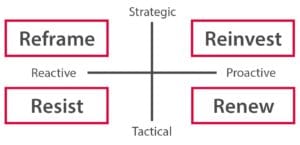Abstract
The widespread adoption of remote working practices in businesses and organisations has created a number of dilemmas leaders need to manage.
In this insight the control vs trust and autonomy vs routine dichotomies are explored together with a framework to define the responses organisations can adopt in the context of the new post pandemic working practices.
Key recommendations
- Trust and control is the most significant dynamic, where it is easy too strong or too
weak on either side of the equation - Remote working highlights that there is no absolute truth behind our teams’ everyday
experiences – peer-learning and reflection between employees becomes more
important - Even when uncertain, clarity and transparency is needed – or even vital
- Wherever we sit when we work, we need social interactions and cues, whether for
shared culture or individual well-being – these need to be engineered when they
don’t happen organically
Balancing Trust and Control
The current pandemic and the associated lockdown and isolation measures, and the drastic reduction in commuting to office-based work, has resulted in significant challenges for those who manage people. Unable to visually control what people do, managers can easily revert to an exacerbated focus or measures that emphasise individual achievement and contribution.
Whilst this is an understandable response from leaders in organisations, it may have unwanted consequences. First, individuals may find their ability to effectively respond to demands (from customers, suppliers or other stakeholders) constrained. Their organisations may be operating at reduced capacity, and their supply chains may have been severely disrupted. Thus, trying to maintain the focus on individual performance may be met with resistance and even perceptions of inequality by frontline and operational staff.
Unprecedented and extreme events by definition, don’t have established procedures. Therefore, flexibility and collaboration are needed(1) to bring about accelerated learning and resilience. Effective processes are more likely to be formulated cohesively and creatively when individuals are trusted to do their best.
Therefore, leaders may need to re-calibrate the relationship between trust and control, given that both are powerful performance management mechanisms.
Fostering Autonomy and Routines
Waking up in the morning, getting dressed and ready to leave home, taking the train or the tube to commute to work, etc. all provide structure and pace to each working day. Working from home can be both a liberating experience or indeed a context difficult to manage. When these tasks that provide structure are eliminated, it is not uncommon to feel disorientation and confusion. How will I manage my day, many will ask?
Moreover, when those elements that offer certainty and familiarity disappear, one needs to find other ‘anchors’ for the day. Therefore, one needs to establish her/his routines to replace the habits of traditional work patterns which are no longer suitable.
Personal routines will vary from individual to individual, and experts suggest the need to be defined with a view of harmonising the personal and the organisational needs of their employers.
Therefore, leaders need to create dialogues and slack to help individuals find the ‘right’ balance between new high levels of autonomy and effective routines to keep people grounded, productive and balanced.
Helping Prioritisation and Focus
The major transformations in ways of operating brought about by the pandemic that businesses and organisations have experienced have resulted in changes in priorities. Some jobs have remained unaltered, but many others have been redefined in terms of tasks and the competencies required to undertake these.
Some organisations have found useful ways of identifying new priorities and communicating these to the workforce. Some businesses have entered such a period of adaptation and frantic reorganisation that have not had the opportunity to provide unequivocal explanations to their workforces about new priorities.
Research in job performance(2), particularly in boundary-spanning roles such as sales and customer management, show that role clarity is significantly correlated to high performance in the job. Therefore, leaders in the context of the pandemic, need to help people establish their priorities with low levels of ambiguity, to perform to the best of their abilities.
Managing the cycle of resisting, reframing, reinventing and renewing
Observing how organisations have responded to the Covid-19 pandemic allows us to see these responses across two dimensions(3): the ‘reactive’ / ‘proactive’ continuum and also the ‘strategic’ vs ‘tactical’.
Taking these dimensions together, one can identify four classes of responses to the effects of the pandemic: Resist, reframe, reinvent and renew. I argue that leaders in organisations need to pay attention and manage these four responses, and to some extent, simultaneously.
Resist
A crisis first triggers a survival instinct. It compels both individuals and organisational systems to find new ways to fight the external threat, to maintain the status quo.
The coronavirus crisis has revealed hundreds of examples of small and large businesses alike who have found ways to continue providing service to their customers even in the most challenging contexts.
Most organisations who have seen their traditional business and service models disrupted have evolved to use technology to compensate for the restriction of movements of their customers and staff. For instance, quarantine has forced consumers to transform their shopping habits. Many shops quickly developed sleek online systems where the customer places the order online and picks it up at the store ensuring safety and security. Home-based working became a widespread practice in companies and organisations and meetings are now largely held via online platforms, with individuals sometimes reporting higher levels of effectiveness.
Restaurants were forced to close. However, millions of consumers still wished to enjoy their favourite dishes from restaurants. As a result, many of these outlets adapted from an on-premise to a takeaway model serving customers on the go or via home delivery. With the help of food distributors like Sysco(4), owners transformed their restaurant dining area into pop up shops, where their customers could shop for essential pantry items while getting their meal to-go.
A plethora of large companies across the world(5) such as Unilever, Mastercard, and Wipro, mobilized resources to fight the coronavirus crises. With commercial fleets grounded, Airbus employed some of its aircraft to support governments fighting the Covid-19 pandemic flying millions of facemasks and thermometers amongst others, to countries where these were most needed.
Reframe
A crisis also often triggers a degree of adaptation that is more radical, resulting in companies significantly reframing their business as part of their response to the crisis.
For instance(6), Anheuser-Busch InBev one of the world’s largest brewers, repurposed its facilities and its supply chain to make and distribute alcohol-based hand sanitiser as opposed to their traditional spirits because of the closing of restaurants, pubs and bars.
For instance, the demand for ventilators rose exponentially, outstripping the availability of equipment of most hospitals. Car manufacturers(7) such as Ford, GM, and engineering companies such as Rolls-Royce, turned to manufacture medical equipment to aid in the coronavirus response.
University labs and workshops started using their know-how in a very creative way to come up with workable solutions to aid in the colossal task of providing quality healthcare in overcrowded hospitals. at University Complutense in Madrid, a workshop in the chemistry faculty started designing an adapter to convert snorkel masks into respiratory gear, suitable for use in clinical settings.
Reinvent
Every crisis conceals an opportunity. The adversity that a traumatic circumstance like the coronavirus brings about, in some organisations turned into a driving force for change and innovation. These organisations, possibly encouraged by individuals with an intrapreneurial (or entrepreneurial) mindset, explore new possibilities and find out new ways of adding value that would not have been identified had it not been for the shock created by a crisis.
For instance, educational institutions are being forced to reinvent learning delivery mechanisms. The lockdown and the closure of nurseries, schools and universities, triggered widespread use of online tuition, self-directed learning, flipped classrooms, and a plethora of remote and distant learning methods and tools. Entire scholarly communities responded to the challenge of social distance, by fundamentally reinventing their traditional ways of working.
There are known examples of companies reinventing themselves, like IBM, whose demise in the early 90s when the company posted the biggest loss in the history of corporate America, $8 billion(8), was followed, a few years later, by a successful turnaround, transforming itself from a traditional hardware manufacturer to a pioneering professional services corporation.
Renew
Renewal is the proactive approach to define specific measures to confront crises, finding novel ways of delivering services and creating value. Renewal entails creativity and a high level of tolerance to ambiguity. In most cases, renewal efforts are underpinned by a fundamental belief in opportunity and optimism.
For instance, during this coronavirus crisis, airlines have been massively impacted by air travel restrictions. Some have started to renew their service provision, to offer passengers a new experience as travel resumes.
If there is a sector that has experienced the worst of this crisis so far, that is the health care sector. Hospitals and other stakeholders in the health care industry are rethinking the way healthcare is provided. New patient-centred approaches are being developed, creating mechanisms to deliver healthcare at the point of use. For instance, with rapid tests, or encouraging patients to stay at home, supplying medicines and basic respiratory equipment and checking their evolution over the phone or online.
The processes for drug development, its protocols, and the length it takes to bring a new drug to the market are being renewed, to warrant their fitness for purpose: safety and efficacy for the patient, and speedier approval and launch.
A plethora of companies has shown higher levels of preoccupation for customers. Insurance companies have extended the coverage of their policies to assist people in difficult times. Financial institutions have created new packages that will help organisations and individuals go through the worse of the crisis. Across sectors, businesses are adopting multiple responses to remain resilient and maintain their relevance and growth.
Summary
Managing performance in unprecedented contexts requires new approaches or at least a balance of established ones where leaders can make a difference by:
- Being aware of the dynamics between trust and control in managing employee
performance - Encouraging peer-learning, reflection and collaboration
- Accepting the surrounding uncertainty but aiming to provide clarity and focus, and
transparency in communications - Nurturing social interaction even if it is virtual
- Fostering the simultaneous pursuit of resisting, reframing, reinventing and renewing
responses.
References
1. Dr Monica Franco-Santos, Daniel Afonso, German Cespedes and Pilar Rivera. Performance Management during the Coronavirus Pandemic. Cranfield School of Management. 12 February 2021.
2. Verbeke, W., Dietz, B., & Verwaal, E. (2011). Drivers of sales performance: a contemporary meta-analysis. Have salespeople become knowledge brokers? Journal of the Academy of Marketing Science, 39(3), 407–428.
3. J Marcos (2020). Sales Growth in Times of Covid-19. How resilient organisations address the current crisis. June, Cranfield School of Management/APS
4. https://foodie.sysco.com/sysco-pop-up-shop/
6. https://www.nytimes.com/2020/03/19/us/distilleries-virus-hand-sanitizer.html





